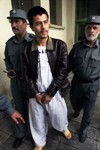 Sayed Parvez Kambakhsh’s ordeal is part of the battle for the soul of Afghanistan, writes Harun Najafizada
Sayed Parvez Kambakhsh’s ordeal is part of the battle for the soul of Afghanistan, writes Harun Najafizada
An appeal court’s decision in Kabul to sentence Sayed Parvez Kambakhsh to 20 years in prison for ‘blasphemy’ has been condemned by the not-so-strong democratic institutions of Afghanistan.
For many media outlets and students in the country, the decision was unexpected.
They were expecting the ‘better judicial system’ in Kabul would evaluate his case impartially and then release him according to the law.
This time the trial was open, a defence lawyer was present and tens of journalists were reporting, but in front of everyone’s eyes the defence was repeatedly interrupted when he tried to question the six witnesses who were brought from Mazar-e-Sharif.
Most of the questions by prosecutors, and answers from the witnesses, were about ‘un-Islamic’ questions Kambakhsh asked his religion tutors at university, rather than about the main ‘offence’ — distributing an article that questioned Islamic attitudes to women.
The hearing continued through the morning, and after the lunch break the judge announced 20 years’ imprisonment for the 24-year-old student.
His defence lawyer, Afzal Noristani, called the trial undemocratic, and added: ‘Everything was pre-planned and there was no chance for me to defend Kambakhsh’s case. There was no need for me at all.’
Kambakhsh’s brother Sayed Yaqub Ibrahimi criticised President Hamid Karzai for not issuing a pardon.
Kambakhsh, 24, was arrested on 27 October 2007 for reported ‘insolence to Islam’ in the northern Afghan city of Mazar-e-Sharif, where he worked as a journalist for the daily newspaper Jahan-e-Naw and studied journalism.
On 22 January 2008 he was sentenced to death by Balkh primary court in a closed door hearing, during which he was denied legal representation.
More than 20 media organisations from across the Asia-Pacific region issued a joint statement calling on President Karzai to uphold the spirit of the Afghanistan Constitution’s stated aim of defending the fundamental freedoms of the people of Afghanistan, including freedom of expression.
Afghans believe the judicial system is one of the most corrupt institutions in the country.
For many ordinary citizens, Kambakhsh’s case is a battle between the ultra-conservative clerics and the democrats who are trying to rule out the old traditions in the country and introduce values such as freedom of speech and thought.
On the other hand, the mullahs, who still have a strong influence in Afghan government and society, feel that if they allow the 24-year-old student to be released, they are paving the way for their enemies.
The timing is not good for Kambakhsh.
His trial took place at a time when there were reports of negotiations between the Taliban and the Afghan government to end the increasing violence in the country.
In addition, Karzai is getting ready to stand for one more term in office. For that he will particularly need the support of the mosques.
However, there is only one more chance for Parvez to flee from this unholy war of ideologies in the deeply traditional society of Afghanistan.
His defence lawyer says he is not happy with the prison sentence and will take the case to the Supreme Court, where there is some hope he will face more educated judges.
But an appeal could take almost one year to complete, and his family is concerned that it could take another year before the court will even consider the case. Until then he will have to live in chains in prison.





